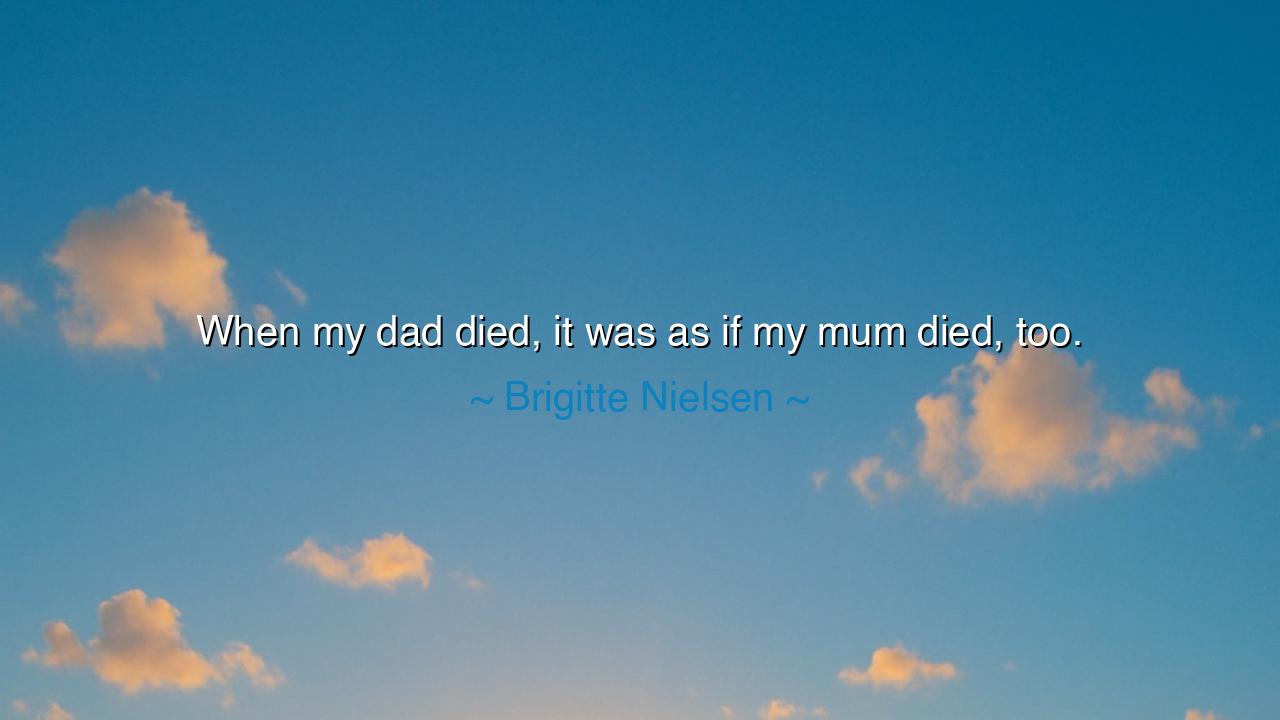
When my dad died, it was as if my mum died, too.






“When my dad died, it was as if my mum died, too.” Thus spoke Brigitte Nielsen, and in her words there resounds the quiet ache of every soul who has watched love collapse beneath the weight of loss. These are not merely words of sorrow, but of understanding — the realization that when one heart in a bond dies, something in the other follows it into silence. For the ancients knew: no life is ever truly lived alone. The spirit of one often entwines with another, and when that thread is severed, what remains is not just grief — it is a shadow of shared being, a hollow where laughter once lived.
The meaning of Nielsen’s words runs deeper than mourning. It speaks of emotional symbiosis, the way two souls in long companionship grow together like the roots of twin trees. Her father’s death was not only the loss of a parent — it was the unmaking of her mother’s world, for love had become the axis around which her mother’s life turned. When that axis broke, all balance was lost. It is a truth that many have seen but few can speak aloud: sometimes the living die not when their hearts stop, but when their reason for living is gone.
This sorrow is ancient and universal. Consider Queen Victoria, whose husband Prince Albert died in 1861. Though she reigned for forty years more, her soul never recovered. She wore black until her own death, retreating into solitude as though she had followed him halfway into the grave. The world saw a queen draped in mourning; what they did not see was a woman who felt as though half her life had been buried with him. Such love, once torn apart, leaves behind not only absence but a haunting — the echo of the other’s presence that refuses to fade.
When Nielsen says her mother died in spirit with her father’s passing, she is not speaking of weakness, but of the depth of devotion that binds two lives over decades. The ancients would have understood this well. Among the Greeks, it was said that true love made two souls one. To lose the beloved, then, was not mere grief — it was a form of self-dismemberment. The Roman poet Ovid wrote of Orpheus, who descended into the underworld to reclaim his lost Eurydice, because he could not bear to exist in a world without her. So too, in countless quiet homes across time, when one dies, the other remains only in body, their spirit already wandering with the departed.
And yet, within this tragedy, there lies also a lesson of tenderness and vigilance. For love is not only joy — it is risk. To love deeply is to open oneself to loss, to accept that one day grief will be the price of having loved truly. But this is the noblest risk of all. The ancient philosophers taught that love, though it may wound, gives life its meaning. To live without such depth is to never truly live. And though the grief that follows such love can feel like death, it also bears a quiet honor — proof that the bond was real, sacred, and worthy of remembrance.
Nielsen’s reflection also teaches us compassion. When we see another broken by loss, let us not urge them to “move on,” for what they mourn is not merely a person, but the collapse of a shared existence. Instead, let us stand beside them in silence and reverence, knowing that the depth of their pain mirrors the depth of their love. The ancients said that grief is love’s shadow — it never appears except where love has burned bright. So, to grieve deeply is not to be weak, but to be faithful to what was beautiful.
So, my child, take this wisdom into your heart: love deeply, knowing it will one day hurt, and cherish those still beside you while the sun still shines on their faces. When death comes — as it must for all — let your grief not destroy you, but remind you of the preciousness of every breath shared. And if ever you find yourself hollowed by loss, remember this: even when one life ends and another seems to fade with it, love itself does not die. It lives on — in memory, in gratitude, and in the quiet, eternal space between two souls that were once one. For though the body may perish, the bond endures, unbroken across the great divide of time.






AAdministratorAdministrator
Welcome, honored guests. Please leave a comment, we will respond soon